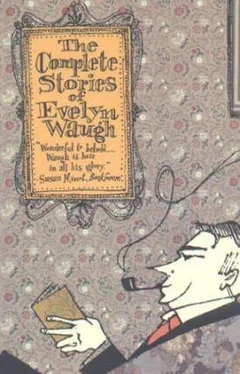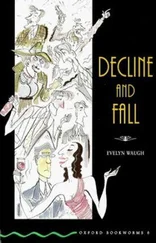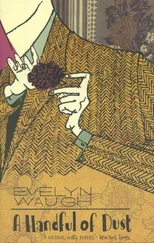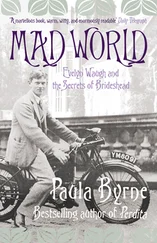Evelyn Waugh - The Complete Stories Of Evelyn Waugh
Здесь есть возможность читать онлайн «Evelyn Waugh - The Complete Stories Of Evelyn Waugh» весь текст электронной книги совершенно бесплатно (целиком полную версию без сокращений). В некоторых случаях можно слушать аудио, скачать через торрент в формате fb2 и присутствует краткое содержание. Год выпуска: 1998, ISBN: 1998, Жанр: Классическая проза, на английском языке. Описание произведения, (предисловие) а так же отзывы посетителей доступны на портале библиотеки ЛибКат.
- Название:The Complete Stories Of Evelyn Waugh
- Автор:
- Жанр:
- Год:1998
- ISBN:0-316-92546-2
- Рейтинг книги:3 / 5. Голосов: 1
-
Избранное:Добавить в избранное
- Отзывы:
-
Ваша оценка:
- 60
- 1
- 2
- 3
- 4
- 5
The Complete Stories Of Evelyn Waugh: краткое содержание, описание и аннотация
Предлагаем к чтению аннотацию, описание, краткое содержание или предисловие (зависит от того, что написал сам автор книги «The Complete Stories Of Evelyn Waugh»). Если вы не нашли необходимую информацию о книге — напишите в комментариях, мы постараемся отыскать её.
The Complete Stories Of Evelyn Waugh — читать онлайн бесплатно полную книгу (весь текст) целиком
Ниже представлен текст книги, разбитый по страницам. Система сохранения места последней прочитанной страницы, позволяет с удобством читать онлайн бесплатно книгу «The Complete Stories Of Evelyn Waugh», без необходимости каждый раз заново искать на чём Вы остановились. Поставьте закладку, и сможете в любой момент перейти на страницу, на которой закончили чтение.
Интервал:
Закладка:
Yet in this is Edward alone among all the other young men in Old Wykamist ties and the Carlton Club. Some few weeks ago he murdered his tutor, a Mr. Curtis. So very few people out of College were aware of Mr. Curtis’s existence that his sudden death was received without consternation. He was just no more seen, as undistinguished dons do disappear in large Colleges. After all it was to everyone’s interest to keep things quiet—Mr. Curtis’s sole relative, a brother with a large practice at Pangbourne, quite realized this when the Warden explained things to him. The police, I think, never heard of it; if they did it was quite soon forgotten. It was said by Poxe—though with how much truth I would not venture to judge—that pressure was brought on Cockburn to keep the affair out of the Isis (there was some doubt about his degree—the Dean of Edward’s College was examining it—but, as I say, I will not make myself responsible for anything Poxe says).
I do not know why Edward hated Mr. Curtis so much. I never had the privilege of meeting him but as I used to watch him moving about the quad, usually alone or with Anne, who is married to the Warden, I thought that he seemed, considering that he was a history tutor, a pleasant young man enough. But, however that may be, Edward hated him with an absorbing and unmeasurable hatred, so that at last he became convinced that Mr. Curtis’s existence was not compatible with his own. This was a state of mind into which any undergraduate might have slipped; where Edward showed himself essentially different from the other young men in Old Wykamist ties in the Carlton Club, was in his immediate perception that the more convenient solution was not suicide but murder. Most undergraduates would kill themselves sooner or later if they stayed up long enough, very few would kill anyone else.
Once decided upon, the murder was accomplished with the straightforward efficiency which one would expect from a student of the cinematograph and one who, until his second failure in History previous (through his inability to draw maps) had been a senior History scholar.
Mr. Curtis’s room was on the first floor just above the side gate. The side gate was closed at nine and the key kept in the porter’s lodge. The other key was kept in the Bursary. Edward knew that this was the key which he would have to take. He went into the Bursary at lunch time and found the Bursar there. The keys were hung on a nail by his desk. The Bursar sat at the desk. Edward began a story of a burned carpet; the Bursar became angry but did not move. He included the sofa; the Bursar stood up but remained at his desk. Edward threw a chair into the conflagration and then described how the three mini-max extinguishers which he had promised were all empty, “perhaps during the Bump Supper; you know, sir.” It was enough; the Bursar strode up and down thoroughly moved; Edward secured the key and hurrying to his room burned the carpet and the sofa and the chair and emptied the extinguishers in case the Bursar should come to investigate. His scout thought him drunk.
Edward then hurried to Mr. Curtis and secured an interview for ten that evening; he sent a note to the President of the Union desiring to speak that evening, it was on Thursday that these things occurred—and then feeling that he had accomplished a good work, lunched very quietly at the Carlton Club.
After lunch Edward set out on his bicycle and rode through much dust to Abingdon. There not at the first antique shop but at the smaller one on the other side of the square, he bought a dagger; at Radley he bought a stone and sitting under a hedge, he sharpened it. Returning with this in his pocket, he lay for a long time in a very hot bath. It was with considerable contentment that he sat down to eat dinner alone at the George—there were still several details to be thought out.
The Union that evening was fuller than usual; some politician from London of enormous distinction was speaking. Edward, in private business, asked questions of force and ingenuity about the despatch boxes, the clock, the gas burners in the roof and the busts of the Prime Ministers: he was observed by all. At five to ten he slipped out saying to the Teller as he went that he was coming back; others were about him who were making for the coffee room while drinks could still be obtained. Edward’s bicycle was among the others at the St. Michael Street gate, clustering about the notice which forbade their presence. In eight minutes he was back again in his place, reviewing with complete satisfaction his evening’s achievement; almost immediately he was called upon to speak. His speech was, perhaps, more successful as an alibi than as a piece of oratory, but few were there to hear it. As he walked home that evening there was singing in his heart. It had been an admirable murder. Everything had happened perfectly. He had gone in at the side gate, unobserved, and reached Mr. Curtis’s room. His tutor had that habit, more fitting for a house master than a don, of continuing to read or write some few words after his visitors entered, in order to emphasize his superiority. It was while he was finishing his sentence that Edward killed him and the sentence was merged into a pool of blood. On his way back, Edward had gone down George Street as far as the canal and there had sunk the dagger. It had been a good evening, Edward thought.
Hastings, the night porter at Edward’s College, always liked to delay people and talk to them in the porch. It was a habit which many resented, but Edward tonight was so overflowing with good nature that he actually started the conversation.
“A dull debate at the Union tonight, Hastings.”
“Indeed, sir; and did you speak?”
“I tried to.”
“Ah, well, sir; if you wanted excitement you should have stayed in College tonight. Most unusual happenings, sir. I don’t think I ever remember anything quite like it happening before, not since I’ve been at the College.”
“Why, what’s happened, Hastings?”
“You may well ask, sir. I knew his Lordship would come to a bad end.”
“Do tell me what has happened, Hastings.”
“Well, sir, you knows what Lord Poxe is when he gets drunk, sir. There’s no stopping him. Well, he come in tonight, sir, oh, very drunk. He never see me when I opened the door—just ran straight in and fell down on the grass. Then he gets up and starts swearing something wicked—said the dons hadn’t no right to put grass there for a gentleman to fall over. Said he was going to go and murder the lot of them.”
“Well, Hastings?”
“Well, he’s done it, sir.”
“What! all of them, Hastings?”
“No, sir, not all; but Mr. Curtis sir. The Dean went to find him to tell him to go to bed and found him asleep on the floor of Mr. Curtis’s room and Mr. Curtis,” with great glee, “dripping blood, sir. Quite slowly, pit-a-pat, as you might say.”
“Well, I’m damned!”
“Yes, indeed, sir. So was the Dean. He is with the Warden now, sir.”
The sky filled with chimes; it was twelve o’clock.
“Well, I must go to bed, Hastings. It’s a funny business.”
“Yes, sir, and good night, sir.”
“Good night, Hastings.”
So Edward went to bed with a grave disquiet. It was a pity that Poxe should have done this; it was really a very great pity. But as he grew sleepier the conviction grew that perhaps this was the best that could have happened. He thought of Poxe—a sad figure. His father had been forced to resign from the Diplomatic Corps after that disgraceful business with the Montenegrin minister’s younger daughter, and had then married his first cousin, begotten an heir and drunken himself to death at the age of forty-two. It was thought that Poxe would never beget an heir, and it was certain that he would not live to be forty-two. He was nearly always half-sober. And so Edward’s thoughts drifted to the decay of great families, to renaissance Italy, and then far away beyond St. Mary’s tower where it was just striking half past twelve. A good evening and sleep…..
Читать дальшеИнтервал:
Закладка:
Похожие книги на «The Complete Stories Of Evelyn Waugh»
Представляем Вашему вниманию похожие книги на «The Complete Stories Of Evelyn Waugh» списком для выбора. Мы отобрали схожую по названию и смыслу литературу в надежде предоставить читателям больше вариантов отыскать новые, интересные, ещё непрочитанные произведения.
Обсуждение, отзывы о книге «The Complete Stories Of Evelyn Waugh» и просто собственные мнения читателей. Оставьте ваши комментарии, напишите, что Вы думаете о произведении, его смысле или главных героях. Укажите что конкретно понравилось, а что нет, и почему Вы так считаете.












